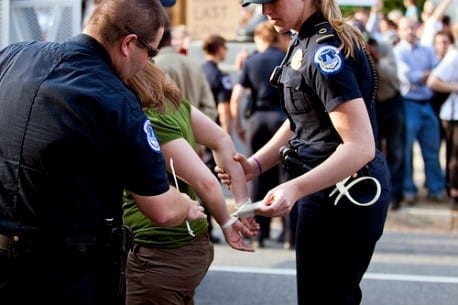Common Defenses against Disorderly Conduct Charges
It was a quiet Friday night in Edgewater, the whoosh of the occasional passing car mingling with the murmur of the NBA playoffs on TVs within apartment buildings. But the calm was punctuated suddenly when the whistle of a police siren sounded near the 6300 block of North Lakewood.
At least, that’s what happened according to a report from the Chicago Sun Times.
A Roger Park District police car signalled for another vehicle to stop, and both drivers pulled over to the side of the road by a group of looming brick apartments. One officer emerged from the squad car and spoke to the driver, citing a minor traffic violation as the reason behind the traffic stop.
The two officers entered the apartment building and walked to the second floor to find the apartment where the yelling had come from, and demanded that the occupants open the door. When the occupants refused, a SWAT team was summoned.
The situation ended after a five-hour standoff when the SWAT team forcibly entered the apartment and arrested all the occupants inside.
The apartment’s occupants included 13 men, 17 women, and one minor girl. The occupants were all taken into custody and charged with disorderly conduct.
Investigators found a firearm and shell casings within the apartment. However, further investigation revealed that the gunfire had actually come from an area behind the apartment. The firearm and shells uncovered were thought to be from a previous shooting.
The 31 people arrested in the incident are in a serious predicament, as disorderly conduct charges carry serious penalties. If convicted, they may face incarceration, probation, and hefty fines. In addition, the disorderly conduct conviction may go on their criminal record, making it difficult for them to secure employment, find housing, or obtain a loan.
A Deeper Look at Disorderly Conduct Charges
Disorderly conduct is a “catch all” term describing unruly, offensive, or rude behavior. There are a variety of criminal acts that could constitute disorderly conduct, including disturbing the peace, refusing to comply with the police, inciting a riot, and public drunkenness.
The loose definition of this crime means that you can find yourself arrested for disorderly conduct for something as seemingly trivial as playing loud music or cursing loudly in public. Oftentimes, disorderly conduct charges are unfair, and can be dropped with the help of an experienced defense attorney.
Possible Defenses
There are a variety of effective defenses to disorderly conduct that a knowledgeable attorney can help you take advantage of. The defense your lawyer uses will depend on the unique circumstances of your case. Below, we’ve included some possibilities.
Freedom of speech. If you are charged with disorderly conduct for making loud noises or engaging in an argument in public, you may be able to cite freedom of speech to defend your right to do so.
 Privacy distinction. Since disorderly conduct charges primarily address disagreeable conduct in public, law enforcement officials should not invoke it for domestic disputes. That means you should not be charged with disorderly conduct if the allegedly offensive behavior occurred inside your home.
Privacy distinction. Since disorderly conduct charges primarily address disagreeable conduct in public, law enforcement officials should not invoke it for domestic disputes. That means you should not be charged with disorderly conduct if the allegedly offensive behavior occurred inside your home.
Failure to prove beyond a reasonable doubt. In order for you to be convicted of disorderly conduct, the prosecutor must prove you are guilty beyond a reasonable doubt. You may be able to have the charges against you reduced or dropped by demonstrating the evidence is contradictory.
Self-defense. If you are being charged for engaging in violent behavior, you may be able to fight the charge by showing you acted in defense of yourself or others. Under Illinois law, you have a right to defend yourself, your property, and others against immediate danger.
It is not uncommon for overzealous police officers to hand out undeserved disorderly conduct charges, and you may be able to avoid serious penalties with a solid defense. However, it is important that you do not act on your own and seek assistance from an aggressive Chicago disorderly conduct attorney as soon as possible.
Your attorney can help you determine which defense to use in your unique situation, and act as your powerful ally in court. With an attorney on your side, you are far more likely to achieve favorable results for your disorderly conduct case. With a successful defense strategy, you can avoid incarceration, fines, and a lifelong blemish on your criminal record.
About the Author:
Andrew M. Weisberg is a former felony prosecutor who now serves as a defense attorney in the greater Chicago area. He has extensive experience in handling all types of criminal cases, from sex offenses and domestic violence to retail theft-related crimes, Murder, and drug crimes.







 Blog Home
Blog Home 











